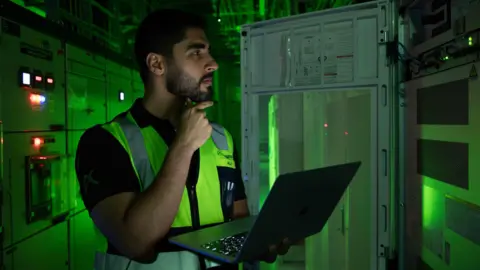### The Emerging Tech Hub in the Gulf
The Gulf states, particularly the United Arab Emirates (UAE) and Saudi Arabia, are aggressively investing in artificial intelligence (AI) technologies, aiming to replace their traditional reliance on oil revenues. With ambitious projects underway, these nations are positioning themselves as significant players on the global AI landscape, yearning for the same respect and recognition that oil once garnered them.
In 2025, former U.S. President Donald Trump made headlines during his visit to the UAE, not just with political statements but also through the announcement of a collaborative AI campus between the UAE and the United States. This initiative is touted as the largest AI infrastructure hub outside of the U.S., a clear marker of the Gulf’s aspirations within the global tech framework. The visit aligning with the easing of U.S. export restrictions on essential microchips from NVIDIA to Gulf nations highlights a growing technological alliance and strategic partnership centered around AI—one that the U.S. now sees as vital for future collaborations.
### The UAE’s Proactive Approach
The UAE has particularly taken the lead in this technology race, prompting massive investments in data centers that will underpin these AI initiatives. Abu Dhabi’s “Stargate” project, specifically designed to accommodate major tech players like OpenAI, signals the multibillion-dollar commitment the Emirati government is making towards establishing a robust AI infrastructure. Financial backing from G42, an Emirati state-linked tech firm, alongside partnerships with global giants such as Cisco, Oracle, and Japan’s SoftBank further cements the UAE’s intent to emerge as a technology hub.
As Hassan Alnaqbi, CEO of Khazna—UAE’s largest data center operator—articulates, “Much like Emirates revolutionized global air travel, the UAE is now poised to dominate as a center for AI and data management.” Khazna’s operations, which consist of 29 data centers across the UAE, place them at the forefront of this technological paradigm shift, playing a crucial role in developing the necessary infrastructure for the region’s digital economy.
### Riding the New Wave of ‘Compute’
Amidst this burgeoning AI drive, the Gulf states recognize the significance of high-performance computing. Mohammed Soliman, a senior fellow at the Middle East Institute, aptly summarizes this notion, stating, “Compute is the new oil.” The analog represents a shift in how resource value is perceived in today’s economy; just as oil fueled industrial growth in the past, the processing power and capabilities provided by advanced data centers will drive the AI revolution.
The Gulf nations aim to position themselves as leaders in providing this computing power globally, a strategy underscored by massive sovereign wealth fund investments into AI capabilities. For instance, Saudi Arabia’s Public Investment Fund has initiated the establishment of the “Humain” AI company, aiming to construct “AI factories” utilizing hundreds of thousands of NVIDIA chips over the next five years. The UAE’s Mubadala has also made substantial investments in local and multinational AI initiatives.
### Challenges and Strategic Alliances
Attracting top-notch AI talent remains a critical hurdle for these Gulf states. In response, the UAE has rolled out incentives such as favorable tax regimes, long-term “golden visas,” and relaxed regulations aimed at drawing international experts. As venture investor Baghdad Gherras observes, establishing world-class digital and AI infrastructure is critical to enticing top-tier talent and nurturing innovative startups.
Despite the strides being made, the Gulf has yet to produce a globally recognized AI company akin to OpenAI or Mistral, and a robust research ecosystem remains thin, hampered in part by the UAE’s relatively small population of just over 10 million.
The motivations behind the Gulf’s burgeoning AI sector also highlight a broader geopolitical landscape, notably the U.S.-China tech rivalry. The recent strategic pivot by the UAE to tighten its partnerships with American firms reflects a shift from energy-for-security agreements to include tech within those alliances. This recalibration emphasizes the critical nature of AI technologies in contemporary international relations and national security.
### Conclusion
In conclusion, the Gulf states are stepping beyond their erstwhile dependency on oil, seeking to harness the potential of AI as the bedrock of future economic growth. Collaborations with the U.S. and the establishment of a sustainable technological ecosystem reflect their ambitions. However, in their pursuit, they face challenges in talent acquisition and establishing significant global presence. The unfolding dynamics will not only shape the economies of the Gulf countries but will also redefine their roles on the international stage in an AI-driven future.












